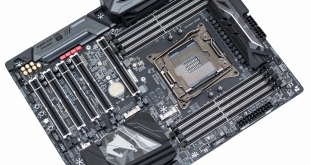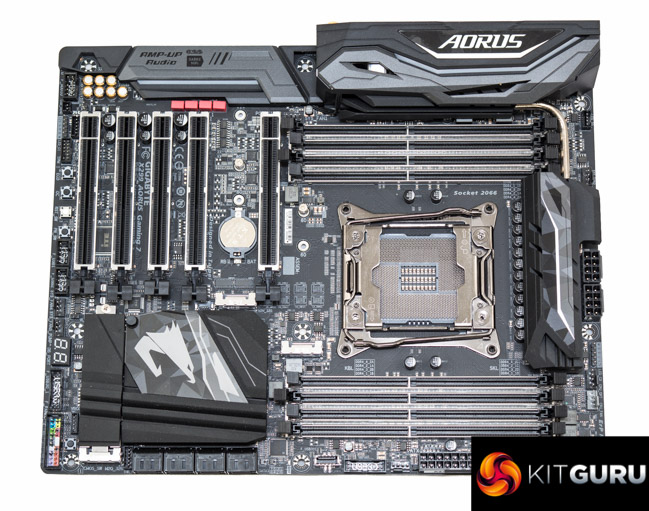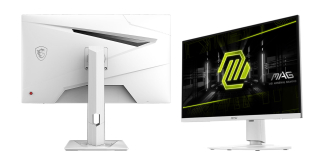
There's a strange divergence in the X299 motherboard segment at the moment where certain motherboards are oriented towards consumers looking to use cheaper Kaby Lake-X CPUs and other motherboards towards Intel's premium Skylake-X. Gigabyte's X299 Aorus Gaming 7 is clearly designed and fit for the Skylake-X audience.

The distinction between Kaby-Lake X and Skylake-X on X299 is perhaps not as clear cut as it seems because there are in effect three tiers that blur into each other at the boundaries – the “entry” level Kaby Lake-X Core i5 and i7s, the “mid-range” Skylake-X Core i7s and the “high-end” Skylake-X Core i9s. The terms entry, mid-range and high-end are all relative terms to the X299 platform because relative to the PC market as a whole every CPU that sits on the X299 platform is high-end.
Gigabyte is clearly grappling with the various tiers of the X299 platform and the oddity that was Intel moving to the Core i9 moniker. Even this X299 Aorus Gaming 7 motherboard is not the company's “top” offering for X299, that title goes to the X299 Aorus Gaming 9.
Gigabyte is attempting to align its branding with that of Intel CPUs but that's easier said than done when Core i5, Core i7 and Core i9 CPUs are available with different CPU architectures overlapping at the Core i7 level. Gigabyte already offers 10 different X299 motherboard models to try and cater to the widely varying Intel CPU price points.
In reality all X299 motherboards will be well equipped due to the high baseline and standard features of the platform but to get the most out of the memory and PCIe connectivity the 44- and 28-lane CPUs are essential since the 16-lane Kaby Lake-X CPUs sacrifice a large number of the aforementioned.
Prospective buyers onto the X299 platform seeking CPUs at the top of the range, Skylake-X Core i7s and above, are Gigabyte's target audience for the Aorus Gaming 7 since anyone spending £400+ on a motherboard should be spending an equivalent sum on a CPU to pair with, if not more. So what does the X299 Aorus Gaming 7 have to offer high-end Skylake-X users?
| Gigabyte X299 Aorus Gaming 7 |
|
| Form Factor | ATX, 30.5cm x 24.4cm |
| CPU Socket | LGA 2066, 8 Phase VRM |
| Chipset | Intel X299 |
| Memory | DDR4, 8 DIMMs, up to 128GB, up to 4400MHz+ with OC, 2 x 2 Phase VRMs |
| Onboard Graphics | None |
| Discrete Graphics | Up to Nvidia 3-way/Quad SLI, AMD 3-Way/Quad CrossFireX |
| Expansion Slots | 3 x PCIe X16 (Two x16, One x8)* 2 x PCIe x16 (x4 Electrical) *With 44-lane CPU x16/x0/x0, x16/x16/x0 or x16/x16/x8 With 28-lane CPU x16/x0/x0, x16/x8/x0 or x8/x8/x8 With 16-lane CPU x8/x0/x0 or x8/x4/x0 |
| Storage | 3 x M.2 (All Support PCIe 3.0 x4/x2 speeds, all support 2280 or smaller, only one slot supports 22110) 8 x SATA III 6Gb/s |
| USB | 6 x USB 3.1 (4 Rear via Realtek Hub RTS5423, 1 Front and 1 Rear (Type-C) via Dual ASMedia Controllers ASM3142) 8 x USB 3.0 (4 Rear via Realtek Hub RTS5411, 4 Front via Chipset) 4 x USB 2.0 (4 Front via Chipset) |
| Networking | 1 x Intel I219V Gigabit 1 x Killer E2500 Gigabit 1 x Killer Wireless AC1535 with Bluetooth 4.1 |
| Audio | Realtek ALC1220 with 7.1 channel HD audio and ES9018Q2C DAC |
| Fan Headers | 8 (2 x CPU, 4 x SYS, 1 x SYS/W_PUMP, 1 x 3AMP) |
| Rear I/O |
1 x PS/2 keyboard/mouse port
1 x USB Type-C port, with USB 3.1 Gen 2 support 4 x USB 3.1 Gen 2 Type-A ports (red) 4 x USB 3.0 (USB 3.1 Gen 1) ports 2 x RJ-45 (Ethernet) ports 2 x MMCX antenna connectors (2T2R) 1 x optical S/PDIF Out connector 5 x audio jacks (Center/Subwoofer Speaker Out, Rear Speaker Out, Line In, Line Out, Mic In) |
| UEFI | 2 x 128Mbit AMI UEFI BIOS |
 KitGuru KitGuru.net – Tech News | Hardware News | Hardware Reviews | IOS | Mobile | Gaming | Graphics Cards
KitGuru KitGuru.net – Tech News | Hardware News | Hardware Reviews | IOS | Mobile | Gaming | Graphics Cards


